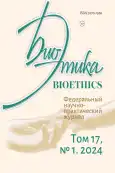Ethics of psychological care in the regional service "112" (based on the material of the Volgograd region)
- Authors: Smirnov V.M.1, Delaryu V.V.1
-
Affiliations:
- Volgograd State Medical University
- Issue: Vol 17, No 1 (2024)
- Pages: 67-70
- Section: Applied Bioethics
- URL: https://journal-vniispk.ru/2070-1586/article/view/256744
- DOI: https://doi.org/10.19163/2070-1586-2024-17-1-67-70
- ID: 256744
Cite item
Full Text
Abstract
In recent years, the Russian Federation has seen the institutionalization of various forms of providing emergency psychological assistance to the population; The Volgograd region is no exception. Thus, in January 2021, on the basis of the State Treasury Institution of the Volgograd Region under the Committee for Ensuring the Life Safety of the Population of the Volgograd Region, within the framework of the "Control and Communications Center", a unified psychological service for emergency operational calls was created to provide emergency psychological assistance and support to residents of the Volgograd Region "112". Assistance is provided in a distant format between applicants/consumers of psychological services and dispatcher psychologists (DP) of the institution; it is available around the clock and does not require a SIM card or funds in the subscriber’s account. The work is carried out using and adapting modern psychological technologies of various directions to resolve the requests of applicants/consumers. A number of ethical problems in providing emergency psychological assistance and support to residents of the Volgograd region by aoperator-psychologist of the unified psychological service for emergency operational calls "112" (to applicants who are intoxicated, parasuicides and suicide victims, employees of the service itself, etc.) are highlighted. It is shown that the identified problems arise from the general problem field of bioethics (situations that are not clearly regulated in the legal field) and a conclusion is made about the expediency based on the agreed position of the organizers of emergency psychological assistance representing various departments, psychologists, lawyers, and specialists in the field of bioethics detailing the legal support for this institutionalized social practice. In principle, the above ethical problems arise from the general problem field of bioethics: situations that are not clearly regulated in the legal field. In this regard, it seems appropriate, based on the agreed position of the organizers of the implementation of emergency psychological assistance, psychologists, lawyers, and specialists in the field of bioethics representing various departments, to detail the legal support for this institutionalized social practice.
Full Text
##article.viewOnOriginalSite##About the authors
Vadim M. Smirnov
Volgograd State Medical University
Email: vadim2011_2011@mail.ru
ORCID iD: 0009-0004-2191-4335
Lecturer of the Department of General and Clinical Psychology
Russian Federation, VolgogradVladimir V. Delaryu
Volgograd State Medical University
Author for correspondence.
Email: vvdnvd@gmail.com
ORCID iD: 0000-0002-2812-4035
Candidate of Medical Sciences, Doctor of Sociological Sciences, Professor, Professor of the Department of General and Clinical Psychology
Russian Federation, VolgogradReferences
- Smirnov V.M. Specifics of organizing emergency medical and psychological care on the territory of Sarpinsky Island: resolved and unresolved issues. Menedzhment v zdra-vookhranenii: vyzovy i riski XXI veka: Sbornik materialov VII mezhdunarodnoi nauchno-prakticheskoi konferentsii = Management in healthcare: challenges and risks of the 21st century: Collection of materials of the VII international sci-entific and practical conference. Volgograd, November 17–18, 2022. Volgograd, VolgSMU Publishing House, 2023:217–219. (in Rus.).
- Shkarin V.V., Raevsky A.A. Providing emergency psycho-logical assistance in the Volgograd region. Vestnik Vol-gogradskogo gosudarstvennogo meditsinskogo universiteta = Journal of Volgograd State Medical University. 2020;2(74):45–47. (in Rus.).
- Shkarin V.V., Donika A.D. Modern trends in providing psychological assistance to dying patients. Aktual'nye vo-prosy klinicheskoi psikhologii v regione. Materialy Vse-rossiiskoi nauchno-prakticheskoi konferentsii = Current is-sues in clinical psychology in the region. Materials of the All-Russian Scientific and Practical Conference. Volgograd, VolgSMU Publishing House, 2020:199–202. (in Rus.).
- Donika A.D., Shchekin G.Yu. Modern trends in research in the problematic field of bioethics. Bioetika = Bioethics. 2017;20(2):60–62. (in Rus.).
- Sedova N.N., Donika A.D. Bioethics. The workshop. Mos-cow, KNORUS, 2024. 154 p. (in Rus.).
- Sedova N.N. Bioethics: Course of lectures. Volgograd, VolgSMU Publishing House, 2011. 216 p. (in Rus.).
Supplementary files







